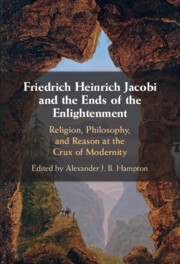 Friedrich Heinrich Jacobi and the Ends of the Enlightenment
Friedrich Heinrich Jacobi and the Ends of the Enlightenment from Part IV - Jacobi’s Impact on Idealism and Romanticism
Published online by Cambridge University Press: 09 February 2023
Jacobi famously contended that Fichte’s transcendental philosophy ultimately leads to metaphysical nihilism, while Fichte himself continued to see a close harmony between the Wissenschaftslehre and Jacobi’s thought. This chapter explores a middle path between these positions in the writings of the two philosophers.
To save this book to your Kindle, first ensure [email protected] is added to your Approved Personal Document E-mail List under your Personal Document Settings on the Manage Your Content and Devices page of your Amazon account. Then enter the ‘name’ part of your Kindle email address below. Find out more about saving to your Kindle.
Note you can select to save to either the @free.kindle.com or @kindle.com variations. ‘@free.kindle.com’ emails are free but can only be saved to your device when it is connected to wi-fi. ‘@kindle.com’ emails can be delivered even when you are not connected to wi-fi, but note that service fees apply.
Find out more about the Kindle Personal Document Service.
To save content items to your account, please confirm that you agree to abide by our usage policies. If this is the first time you use this feature, you will be asked to authorise Cambridge Core to connect with your account. Find out more about saving content to Dropbox.
To save content items to your account, please confirm that you agree to abide by our usage policies. If this is the first time you use this feature, you will be asked to authorise Cambridge Core to connect with your account. Find out more about saving content to Google Drive.